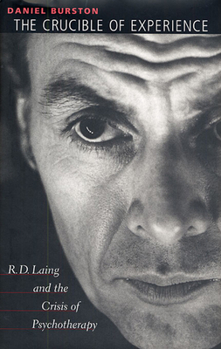The Crucible of Experience: R. D. Laing and the Crisis of Psychotherapy
One of the great rebels of psychiatry, R. D. Laing challenged prevailing models of madness and the nature and limits of psychiatric authority. In this brief and lucid book, Laing's widely praised biographer distills the essence of Laing's vision, which was religious and philosophical as well as psychological.
Format:Hardcover
Language:English
ISBN:0674002172
ISBN13:9780674002173
Release Date:May 2000
Publisher:Harvard University Press
Length:192 Pages
Weight:0.90 lbs.
Dimensions:0.8" x 6.2" x 9.6"
Customer Reviews
2 ratings
Worth reading, but uneven
Published by Thriftbooks.com User , 24 years ago
Daniel Burston, a professor in the existential-phenomenological psychology program at Duquesne University and a respected Laing scholar, has put together a very well-written, interesting, but uneven work on the manifold ways in which Laing's thought can be connected with psychotherapy. After reading his excellent, rigorously intellectual biography of Laing, _The Wing of Madness_, I had expected to find in the _Crucible of Experience_ an equivalent depth of scholarly knowledge and clarity. And some sections of the book do possess this. The chapter on normality and the numinous, for instance, offers a very patient and careful teasing-apart of the many meanings of "normality" and how Laing treated these different meanings in his understandings of mental disorder. Other sections, however, were not as impressive. The chapter on Laing's roots in existentialism and phenomenology, for example, was far too reliant on secondary sources, and its summaries of the views of the various existential and phenomenological philosophers often felt curt and staccato. One more serious problem I had with this work was that it mostly ignored Laing's conceptualization of what he termed "knots:"- contradictory, paradoxical, and entangling patterns of relatedness that create vicious circles. (see Laing's own book _Knots_) From my perspective, "knots" are probably the most relevant element of Laing's thought for psychotherapy, thus, their omission is rather glaring. Overall, however, Burston's book is a well-written, enjoyable, and thoughtful journey through the labyrinths of Laing's thinking.
Worth reading, but uneven
Published by Thriftbooks.com User , 24 years ago
Daniel Burston, a professor in the existential-phenomenological psychology program at Duquesne University and a respected Laing scholar, has put together a very well-written, interesting, but uneven work on the manifold ways in which Laing's thought can be connected with psychotherapy. After reading his excellent, rigorously intellectual biography of Laing, _The Wing of Madness_, I had expected to find in the _Crucible of Experience_ an equivalent depth of scholarly knowledge and clarity. And some sections of the book do possess this. The chapter on normality and the numinous, for instance, offers a very patient and careful teasing-apart of the many meanings of "normality" and how Laing treated these different meanings in his understandings of mental disorder. Other sections, however, are not as impressive. The chapter on Laing's roots in existentialism and phenomenology, for example, is far too reliant on secondary sources, and its summaries of the views of the various existential and phenomenological philosophers often feel curt and staccato. One more serious problem I have with this work is that it mostly ignores Laing's conceptualization of what he termed "knots:"- contradictory, paradoxical, and entangling patterns of relatedness that create vicious circles. (see Laing's own book _Knots_) From my perspective, the notion of "knots" is probably the most relevant element of Laing's thought for psychotherapy, as the concept can richly describe and account for repetitive trauma, compulsions, "inner" conflict, and all sorts of other contradictory and circular patterns of interpersonal experience that therapists often run into. Therefore, to me, the omission of this concept is rather glaring. Overall, however, Burston's book is a well-written, enjoyable, and thoughtful journey through the labyrinths of Laing's thinking.






